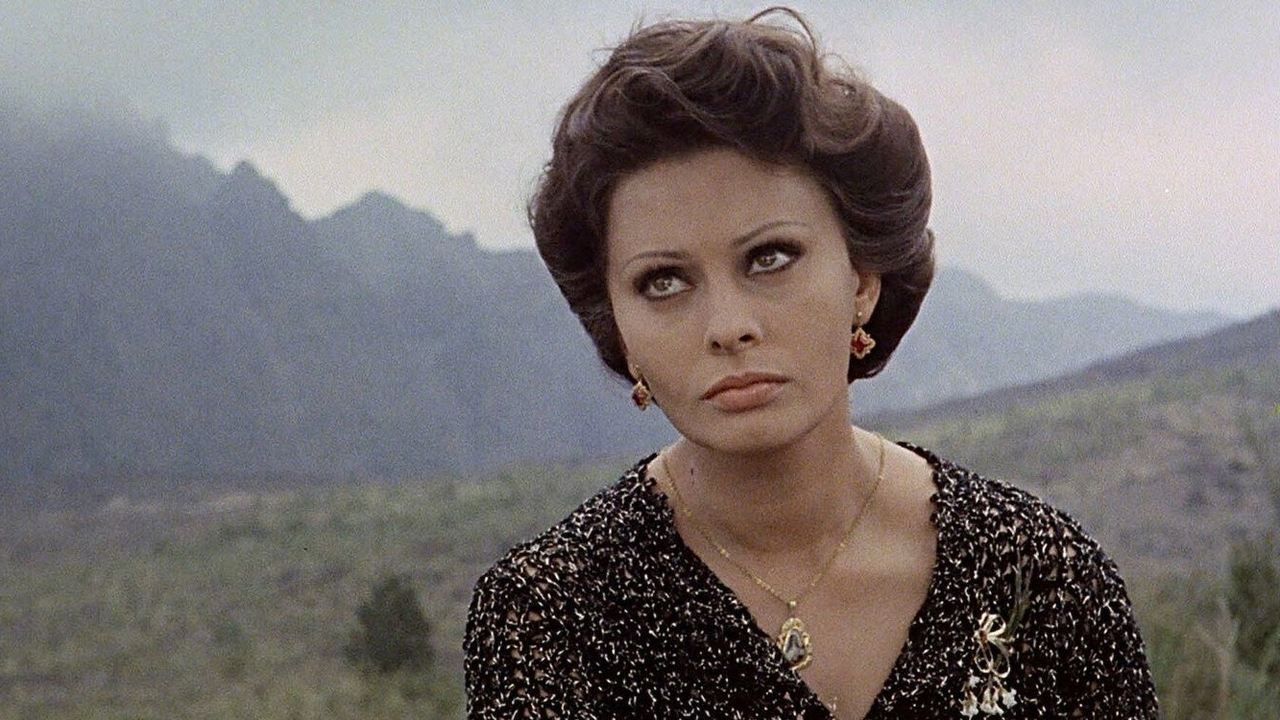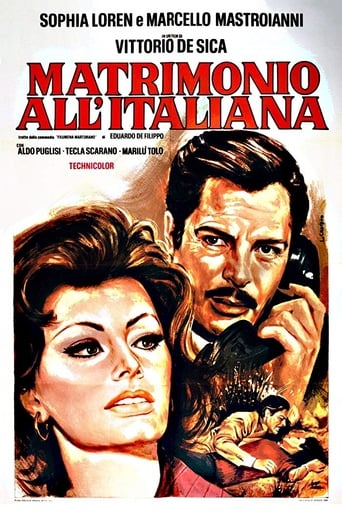

A bit overrated, but still an amazing film
... View MoreLet me be very fair here, this is not the best movie in my opinion. But, this movie is fun, it has purpose and is very enjoyable to watch.
... View MoreThere are moments that feel comical, some horrific, and some downright inspiring but the tonal shifts hardly matter as the end results come to a film that's perfect for this time.
... View MoreA terrific literary drama and character piece that shows how the process of creating art can be seen differently by those doing it and those looking at it from the outside.
... View MoreA film of surprising depth, with an excellent performance from Sophia Loren. I was really quite taken with the film, which is more drama than comedy, and about an unequal love affair between Loren and Marcello Mastroianni over a couple decades. Loren loves Mastroianni, but he sees their relationship more as a transaction: he gives her money, gets her out of prostitution, and gives her a place to stay; she gives him sex, keeps his house, runs his bakery, and takes care of his elderly mother. Meanwhile, he travels the world and sees other women. The tragic imbalance hits us right in the heart, and is heightened by Director Vittorio De Sica's storytelling, which is with a light touch, and uses flashbacks to gradually fill us in on the past, and just how unequal things are. Mastroianni is a bit of a villain here, but we hardly know it at the beginning, and De Sica lets the viewer connect the dots as the movie progresses. We can see the pain in Loren's face and read her mind, and often that's enough. The way the characters express themselves, the scenes in the streets of Naples - it all seems perfectly realistic, and a slice of life. The touches of comedy and lightness that are present balance out the story well. Better than 'Yesterday, Today, and Tomorrow', and on a par with 'Two Women'. What an extraordinary interval of time this was for Loren and De Sica.
... View MoreAlthough I know Vittorio De Sica by reputation as one of Italy's most famous directors, I am not particularly familiar with his work; classic Italian films rarely turn up on British television. When, therefore, the specialist movie channel Talking Pictures recently showed his "Matrimonio all'Italiana" I jumped at the chance to watch it, even though it was dubbed into English. (I greatly prefer to watch foreign-language films with subtitles, partly because I find it off-putting to watch actors whose words do not match their lip movements, and partly because comparing the spoken dialogue with the translation helps me improve my knowledge of the language. Although I gather that in this case much of the dialogue is in Neapolitan dialect rather than standard Italian, so it wouldn't have been much use to me).During World War II Domenico Soriano, a wealthy and successful young businessman, meets a seventeen-year-old girl named Filumena Marturano working in a brothel. The two begin a relationship and eventually Domenico takes her out of the brothel and sets her up in a flat as his mistress. There Filumena, who comes from a very poor background, has an enviable standard of living, but her one concern is that Domenico always refuses to marry her, even though he is single and there is no other woman in his life.The main action takes place twenty-odd years later. Domenico is now around fifty, although still handsome, but Filumena, at forty, is now losing her looks. Matters come to a head when she discovers that Domenico is planning to marry a girl who works in his business, young enough to be his daughter. She resorts to a subterfuge, pretending to be seriously ill. Believing Filumena to be on her deathbed, Domenico agrees to marry her, only for her to stage a remarkable recovery as soon as the marriage has taken place.The title (normally rendered in English as "Marriage Italian Style") suggests that director Vittorio De Sica, or rather Eduardo De Filippo who wrote the play upon which the film was based, intended to satirise Italian sexual mores, particularly the way in which Italian men treat women. (Perhaps De Filippo was being too hard on his fellow-countrymen; I am sure that men like Domenico can be found in most countries). The film is sometimes referred to as a "romantic comedy", but in fact the comedy is often bitter and cynical, with little that is in any way romantic about it. Domenico is a singularly unpleasant figure, the sort of man who never thinks of anyone other than himself and who never does anything without a self-centred motive. He thinks that he owns Filumena and probably thinks that he will own his virginal young fiancée after their planned marriage.Filumena herself can certainly be self-centred as well as devious, but in her case there are two mitigating factors. The first is that her arrangement with Domenico is the only escape she can see from the two equally unappealing alternatives of life as a prostitute or a life of grinding poverty in the slums of Naples. The second is that she has a genuine affection for her sons.Oh yes, Filumena has sons, three of them to be precise. This revelation towards the end of the film comes as a surprise to the audience. It comes as a surprise to Domenico as well. It does rather strain credibility to ask us to accept that Domenico failed to notice, on three separate occasions, that his mistress was pregnant, but De Filippo was probably using implausibility for satirical effect to emphasise just how little interest Italian men show in their women. To make matters worse from Domenico's point of view, he turns out to have fathered only one of the boys, and Filumena refuses to tell him which is his or who the other two fathers are.Marcello Mastroianni makes Domenico convincingly nasty, although Sophia Loren has a rather more difficult task. At the time the film was made in 1964, Loren, one of the world's most famously beautiful actresses, would have been around thirty, but here she is not called upon to play a beautiful thirty-year-old. In the scenes set in the forties Filumena is a naïve teenager and in those set in the sixties she is a careworn, fading woman of forty. Perhaps surprisingly, she succeeds better in the latter of these two roles, with the aid of some creative make-up. She never really seems convincing as a teenager."Marriage Italian Style" is enjoyable enough as a comedy of manners, or perhaps a comedy of lack of manners, although I felt that it didn't really have enough depth to justify the "classic" status some have claimed for it. Nevertheless, it did enough to make me want to make sure I set the video recorder next time one of de Sica's films comes on TV. 6/10
... View MoreFirst of all I think the naming of the movie was rather irrelevant... "Marriage Italian Style"! Well it was about everything but Italian style marriage. They named it after the great "Divorce Italian Style" to lure audience into cinema but that's not really important. It was a descent movie despite the Very flat opening, cheesy flash backs, Not so great performances but overall probably because of chemistry between Sophia Loren and Marcello Mastroianni it turned out to be a memorable romance drama movie which doesn't hurt to watch but not essential. I can't think it could be better than this because the potential was very limited in first place. For what it was, it was a good NOT AWARD WORTHY movie.
... View MoreThe film employs a tremendously perky rhythm and register to showcase the traits of the earthly Italy at its post-war development, even though essentially the overwrought kernel of a prostitute's tribulations could hardly appropriate as a comedy material. Vittorio De Sica's camera enigmatically haunts and pivots around two leads' present and past, the intangible love/hate chaos is disarmingly intriguing and subconsciously imbues the audience with a fervent compassion towards Sophia Loren's unswerving while passionate Filumena. The leading performance is worth of much accolade, especially for Sophia Loren, whose full-brown force of personality spanning over 20 years in the film and indisputably devotes a magnificent performance with all her zest and vigor. Marcello Mastroianni, is great as well, to hone up his versatility and render the womanizer an ambiguous moral criterion which is a more delicate task. I cannot help being fascinated by the exquisite script as well, credited by five names, no wonder all the twists and turns are so fruitful in a way that both surprising and amusing. Nominated for 2 Oscars (BEST FOREIGN FILM and a second BEST ACTRESS nomination for Loren) and is a milestone which not only represents Loren's heyday but also is a comforting fruition of Loren-Conti correlation. Maybe it is not director De Sica's best canon due to its slight superficiality of machismo, which I sense may not be the director's fault as it is a general bias lies in all over the globe. Anyway, the film itself surely is a fine piece captures a genuine Italian aura (the Naples' style) and definitely worth your pocket.
... View More